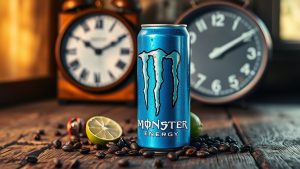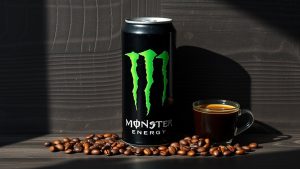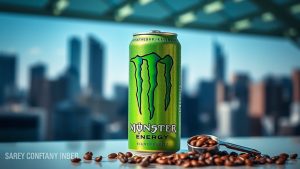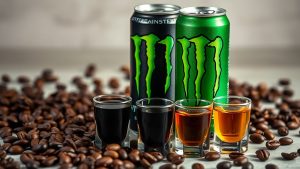
Monster Energy drinks have varying caffeine levels. A standard 16 oz serving delivers about 160 mg of caffeine, while some flavors, like Java Monster, can pack up to 300 mg per can. On the other hand, Monster Unleaded has less than 20 mg. It's important to be mindful of your caffeine intake since excessive consumption can lead to health risks. If you want to explore more about the different flavors and their effects, there's plenty more to discover.
When you crack open a can of Monster Energy, you're likely to find about 160 mg of caffeine in a standard 16 oz serving, a figure that aligns closely with the amount found in a strong cup of coffee. This relatively high caffeine content makes Monster Energy popular among those looking for a quick energy boost.
Curiously, some of Monster's flavors, like Java Monster, can pack up to 300 mg of caffeine per can, showcasing the variation in caffeine levels across their product line. In contrast, a lighter option like Monster Unleaded has less than 20 mg, demonstrating that not all Monster drinks are created equal with regard to caffeine.
Some Monster flavors vary greatly in caffeine content, from 300 mg in Java Monster to under 20 mg in Monster Unleaded.
When comparing Monster Energy to other energy drinks, you'll see that it holds its ground. A can of Red Bull contains about 80 mg of caffeine in just 8.4 oz, while Rockstar's drinks can range from 160 mg to 240 mg per 16 oz can. For those seeking a more potent kick, Bang Energy offers a hefty 300 mg in a similar serving size.
With these variations, it's crucial to know what you're consuming and how it stacks up against your daily caffeine intake. The general recommendation for adults is to limit caffeine intake to around 400 mg per day from all sources. Monster also advises against consuming more than 48 oz of their drinks in a day, a guideline worth considering to avoid potential health risks.
For pregnant women or anyone sensitive to caffeine, it's best to steer clear of energy drinks altogether, including Monster. While moderate consumption is deemed safe by regulatory bodies like the European Food Safety Authority (EFSA), excessive intake can lead to serious health issues, such as cardiac arrhythmias and anxiety disorders.
Regarding ingredients, Monster consists of carbonated water, sugars, taurine, ginseng, and various B vitamins. Most likely, it contains synthetic caffeine, but the exact source isn't specified on the label. Ingredients like taurine and guarana have raised health concerns, especially in larger quantities, so understanding the formulation can help you gauge the drink's overall impact. Excessive caffeine consumption can lead to dehydration and anxiety, raising concerns about health risks].
While instances of caffeine toxicity linked to energy drinks have made headlines, the causal relationships are often debated. The FDA has received reports associating energy drink consumption with several adverse health effects, including fatalities. However, the EFSA maintains that moderate consumption of drinks like Monster is generally safe for most people.
As one of the top-selling energy drinks globally, Monster Energy has established a solid foothold in the market. Its popularity is driven by the high caffeine content and unique flavor offerings, catering to a wide audience.
Understanding the caffeine content in Monster Energy drinks can help you make informed choices about your consumption and how it fits into your lifestyle.
Conclusion
To sum up, Monster Energy Drinks pack a punch with caffeine levels ranging from 80 to 300 mg, depending on the variety. Think of caffeine as the fuel that powers your engine, giving you that extra boost when you need it most. However, it's crucial to enjoy these drinks responsibly, as too much caffeine can lead to jitters and other health issues. Keep your consumption in check, and you'll be ready to tackle whatever comes your way!



